Best of #econtwitter - Week of October 3, 2021 [2/2]
Oct 04, 2021
Welcome readers old and new to this week’s edition of Best of Econtwitter. Thanks to those sharing suggestions, over email or on Twitter @just_economics.
This is part two of two, this week. Part one is here.
Paper summary threads

Jonathan Mummolo@jonmummolo
Our new working paper: tell the computer what you know (and don't know!) about a causal question w/ discrete data → automatically get most precise possible answer (bounds, or a point estimate). Joint w/ @guilhermejd1 @nsfinkelstein @dean_c_knox Shpitser.🧵arxiv.org/abs/2109.13471

2:06 PM · Sep 29, 2021
135 Reposts · 557 Likes

Alexander Berger@albrgr
Impressive meta-analysis of the impact of cash transfers on subjective wellbeing from @HappierLivesIns: happierlivesinstitute.org/uploads/1/0/9/…
If my math is right, effect on life satisfaction per $ doubling is very close to what you'd read off this old @BetseyStevenson @JustinWolfers chart:
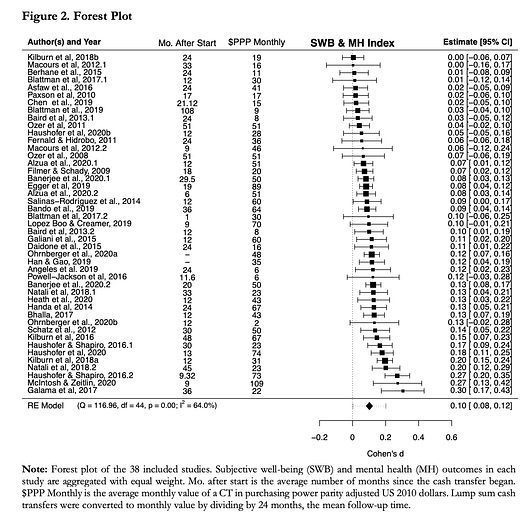
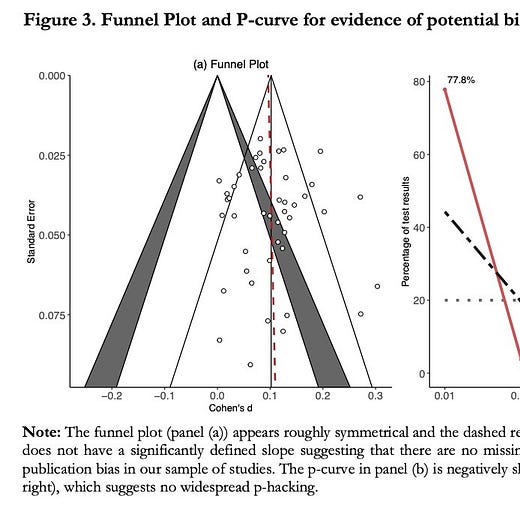
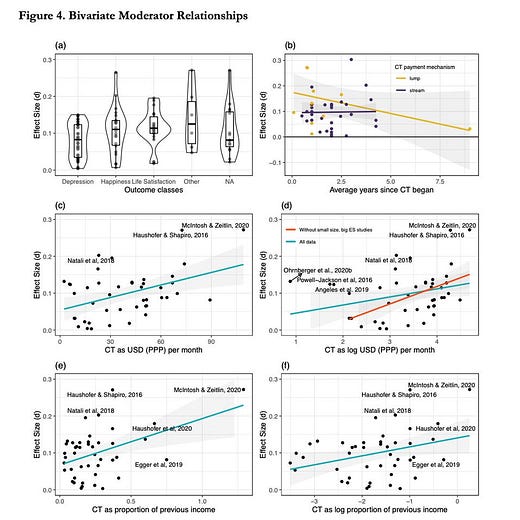
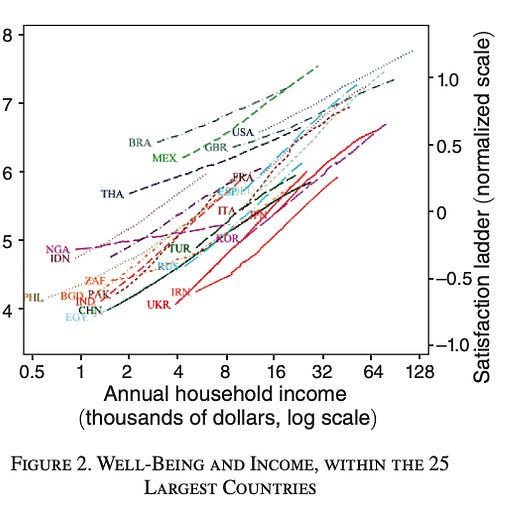
6:06 PM · Oct 1, 2021
12 Reposts · 55 Likes

Sarah Cohodes@SarahCohodes
📢📢 New Working Paper Alert 📢📢
Joint with @jamesfeigenbaum
“Why Does Education Increase Voting? Evidence from Boston’s Charter Schools”
nber.org/papers/w29308
1/n

1:12 PM · Sep 27, 2021
50 Reposts · 177 Likes

Michael Eddy@MichaelEddy
Privatizing sanitation in Dakar led to productivity improvements and arguably a ~5% reduction in diarrhea rates among children under five in Dakar.
New @nberpubs by @JoshDeutschmann @MollyMLipscomb @GarsJared @LauraASchechter & Houde
nber.org/papers/w29295 #nbermonday #WASH
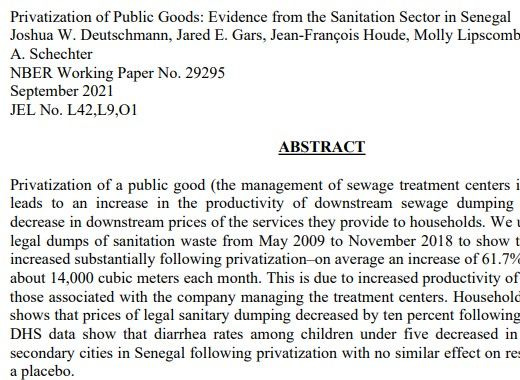
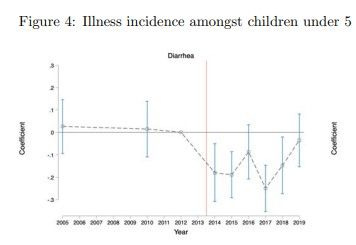
6:14 PM · Sep 27, 2021
25 Reposts · 69 Likes

Justin Sandefur@JustinSandefur
Do charity fundraising appeals generate new money, or offset other donations?
Answer: new money, with no later reduction for the target charity.
Weirdly, donations to *other* charities also go up, but later fall slightly.


AEA Journals @AEAjournals
Forthcoming in AEJ: Economic Policy: "Lift and Shift: The Effect of Fundraising Interventions in Charity Space and Time" by Kimberly Scharf, Sarah Smith, and Mark Ottoni-Wilhelm. https://t.co/tT9HEnVUFS
6:49 PM · Sep 28, 2021
27 Reposts · 71 Likes

Robert Dur@DurRobert
Are men overconfident and women underconfident?
What experts believe and what the data say differ widely.
Men are from Mars, and Women Too: dropbox.com/s/8vmlohipf2no… by @orianabandiera, Nidhi Parekh,
Barbara Petrongolo, and Michelle Rao


11:43 AM · Oct 3, 2021
10 Reposts · 39 Likes
More: trade war, robot adoption in surgery, effects of good schools, business grants vs. cash transfers, CTC expansion, declining US birth rates
Public goods

Shengwu Li@ShengwuLi
I've put together presentation advice for econ theory talks.
It's coming that time of year when many young theorists rapidly learn to present papers, so I thought this might be useful.
drive.google.com
Theory_Presentation_Advice.pdf

1:57 PM · Oct 1, 2021
176 Reposts · 704 Likes
^related very good thread:

Ben Golub@ben_golub
A few observations to add, in the form of common mistakes.
A. "The audience as computer" aka "important things need to be written to memory once." In fact, nobody learns anything except the simplest things the first time. Important points should persist across a few slides.
1/

Shengwu Li @ShengwuLi
I've put together presentation advice for econ theory talks.
It's coming that time of year when many young theorists rapidly learn to present papers, so I thought this might be useful.
https://t.co/aihRou24Ii
6:54 PM · Oct 1, 2021
15 Reposts · 111 Likes

Ben Golub@ben_golub
E. Not treating a talk as an important performance.
A senior theorist told me that after his first big talk, a very senior theorist told him that while a seminar looks like no big deal, it's Carnegie Hall for us - "Why didn't you treat it that way?"
8:30 PM · Oct 1, 2021
24 Likes
Interesting discussions

Dean Eckles@deaneckles
Many social science papers, especially with novel data, yield multiple interesting findings.
But sometimes there are pressures to tell one simple story, which leads to some findings being neglected, even when the paper is highly cited.
gojiberries.io
Unsighted: Why Some Important Findings Remain Uncited

6:35 PM · Sep 27, 2021
3 Reposts · 28 Likes

Dean Eckles@deaneckles
This makes me think there can be benefits of more papers, even if some are "least publishable units" because otherwise our whole system (metadata, citation practices) can make our accumulating knowledge illegible.
6:38 PM · Sep 27, 2021
1 Repost · 6 Likes

Florin Bilbiie@FlorinBilbiie
Exciting news and times for Economics in Europe!
CEPR headquarters moving to Paris.
Annual symposium (NBER SI-style) also in Paris -- like many of us have been "asking for" since long.
@cepr_org

CEPR @cepr_org
CEPR President @bweder announces a major expansion for Europe’s leading Economic Policy Research network.
Today in Paris, le Ministère de l'Enseignement supérieur, de la Recherche et de l'Innovation (MESRI) hosted a ceremony to celebrate a declaration of partnership… https://t.co/XPFdOJKSbn
12:13 PM · Oct 1, 2021
9 Reposts · 103 Likes

Jessica Leight@leightjessica
Good thread. I don't agree with all of the suggestions, but there is a LOT of room for experimentation in economics around this challenge and currently I see almost no experimentation. Limiting the length of referee reports seems like an easy one.

Anup Malani @anup_malani
Researchers spend inordinate time responding to editor & referee reports. Some of that is very valuable. But a lot has low or negative returns. If academic R&D is valuable to policymaking or productivity, this could be very costly. 🧵 on ideas to solve this.
6:45 PM · Sep 29, 2021

Gregg Gonsalves@gregggonsalves
The fact that my colleagues @Jabaluck & @mushfiq_econ had to do the mask study is another case in point. Economists led the way, while the biomedical researchers racked up tiny study after tiny study of hydroxychloroquine in 2020. Look at clinicaltrials.gov & weep. 7/
clinicaltrials.gov
Home - ClinicalTrials.gov

9:53 AM · Sep 27, 2021
16 Reposts · 106 Likes

Arpit Gupta@arpitrage
I dream of a day when economics can, also, go from an oral and beamer culture to rediscover writing

Ramanand @quatrainman
Why do established companies like Amazon and upcoming startups like Stripe swear by a writing-oriented culture? Because they believe that the use of Powerpoint-like communication leads to poorer decisions and to sub-standard information sharing inside an organization.
2:42 AM · Sep 29, 2021
2 Reposts · 59 Likes

